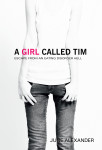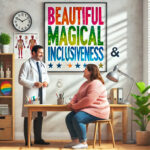Grandmothers can beat eating disorders too
Grandmothers can beat eating disorders too
Grandmothers have eating disorders too. Yes, they do. Often they have suffered since childhood. The eating disorder has denied these women a full life. Left unchallenged the illness becomes entrenched with each passing year. Having cruelly sabotaged childhood, it proceeds to rob women of the freedom to fully embrace being a mother, and a grandmother.
When I wrote my memoir, A Girl Called Tim, my dream was to let other women, whose life had been tormented by an eating disorder, know that they were not alone, that they were not weak, that they had an illness, and that they could be helped, could regain their true self and freedom to embrace the joys of life.
Every week, readers write and share that my story is also their story, and that now they are seeking help. Often for the first time. Many women who today are in their 50s, 60s and older, did not have opportunity for early intervention in treatment of their eating disorder. They have suffered silently, at huge cost to their happiness, health and relationships.
Heartening news is that researchers are recognising that even when the illness is considered chronic or enduring, recovery is possible. For instance, the work of Lisa Dawson, Paul Rhodes and Stephen Touyz on ‘The recovery model and anorexia nervosa’.
Doing the Impossible
“Doing the Impossible” The Process of Recovery From Chronic Anorexia Nervosa (Dawson, Rhodes, Touyz) is heartening for women who perhaps have been led to believe that ‘nothing can be done’, that they are ‘stuck’ with their eating disorder for life, that they might as well ‘go home and stop wasting the doctor’s time’.
I am one of eight cases studies quoted in this welcome research from The University of Sydney.
The researchers describe their work:
In this study, we aimed to explore the process of recovery over time from the perspective of those who had fully recovered from chronic anorexia nervosa (AN), using stringent recovery criteria. Eight women, assessed as fully recovered from chronic AN, told their story of the process of recovery. Data were analyzed using the qualitative method, narrative inquiry. Recovery was identified as a long and complex process that spanned four phases: from being unable or unready to change, to experiencing a tipping point where motivation increased and changed in quality, allowing the women to take action against the AN and finally allowing them to reflect and rehabilitate. Results provide a framework for understanding this complex process. Findings suggest that full recovery from chronic AN is possible and emphasize the importance of hope, motivation, self-efficacy, and support from others in the recovery process.
So, hold on to hope at all times. Refuse to accept that ‘this is as good as it gets’. Recovery IS possible.
Our Inner Child – Regaining Our Self
In my own recovery, I found it helpful to nurture my child within.
When fears and anxieties threatened, I learnt to hug my little girl within – hug her tightly and promise to keep her safe. As I was this little girl’s prime keeper, I wanted to take great care of her. I didn’t want her to be lonely, afraid, cold or hungry.
So I would keep her company, hold her hand, keep her warm, treat her kindly and most importantly feed her with three nutritious meals daily and three snacks as well. At some level, I knew that this little girl was me, and we increasingly became ‘one’.
It doesn’t matter how old we are, we need to look after our little child, whose development was interrupted when we were young.
I learnt to love my child within and you can, too. I would ask myself: “Do I want to hurt and bruise my little child (by not eating/by bingeing etc etc)?” and of course the answer every time was ‘No’.
I would say over and over:
* I want to love my child within.
* I do love my child within.
*I can love my child within.
And in doing so, I began to love, trust and believe in my own True Self.
Focus on your inner child, determinedly push other thoughts away. Take pride in caring for your child. I suggest you write in your journal about your joy and fulfiment and purpose in doing this – maybe in the form of letters to your child, or pen a poem about your child.
http://www.thatslife.com.au/Article/Real-Life/Real-Life-Stories/I-beat-anorexia-at-55
http://dennisjones.com.au/TitleDetail.php?recordID=9781742570792






